Breaking Beta | Is Creatine Useful for Climbers?
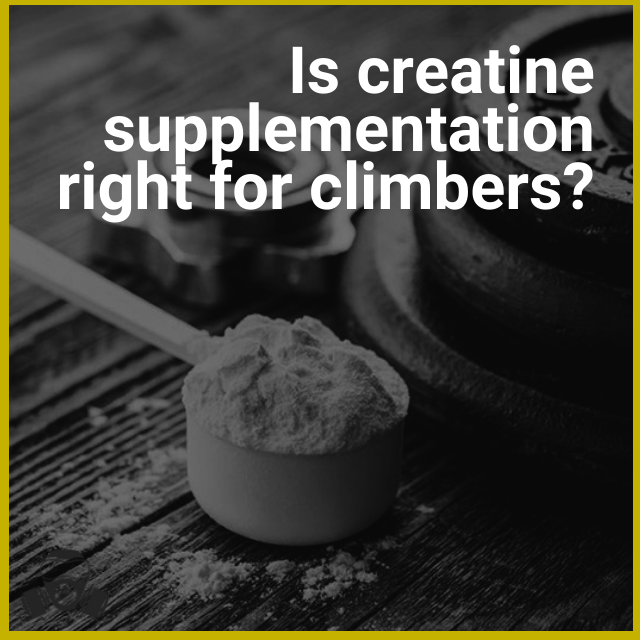
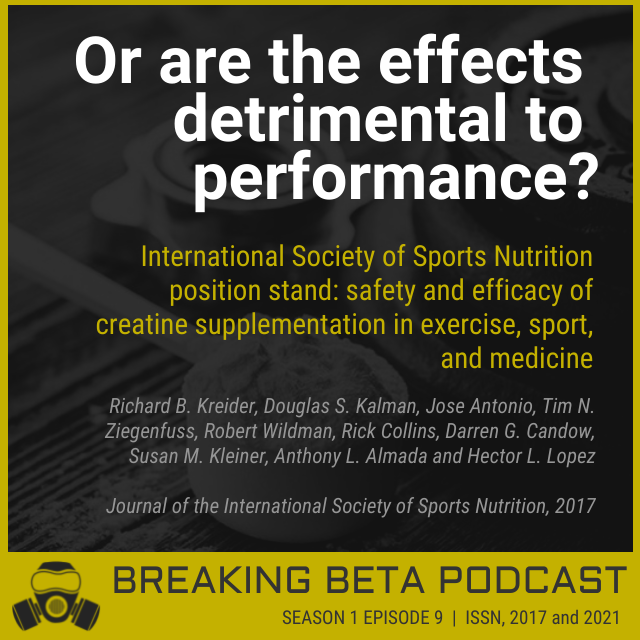
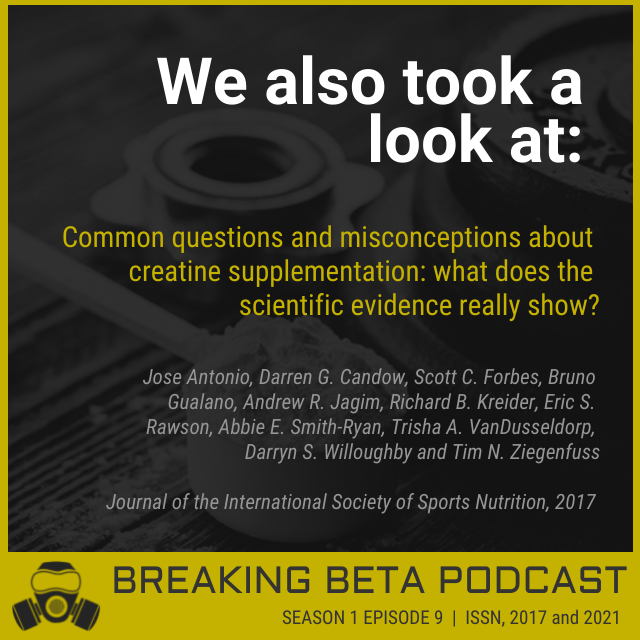
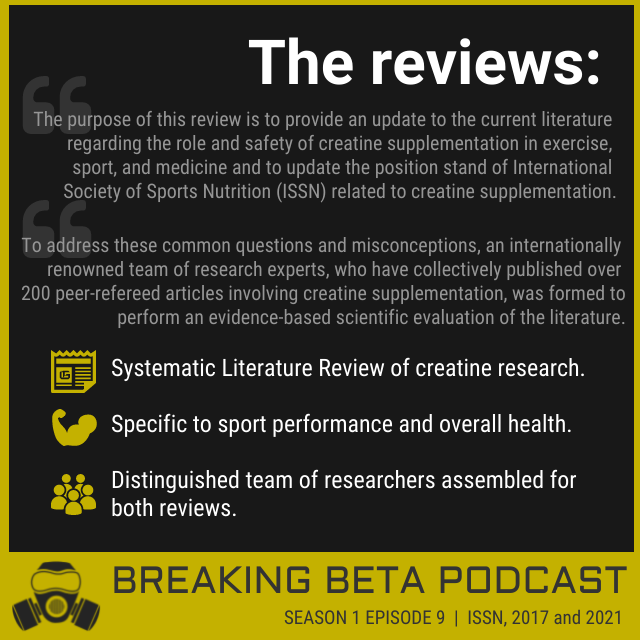
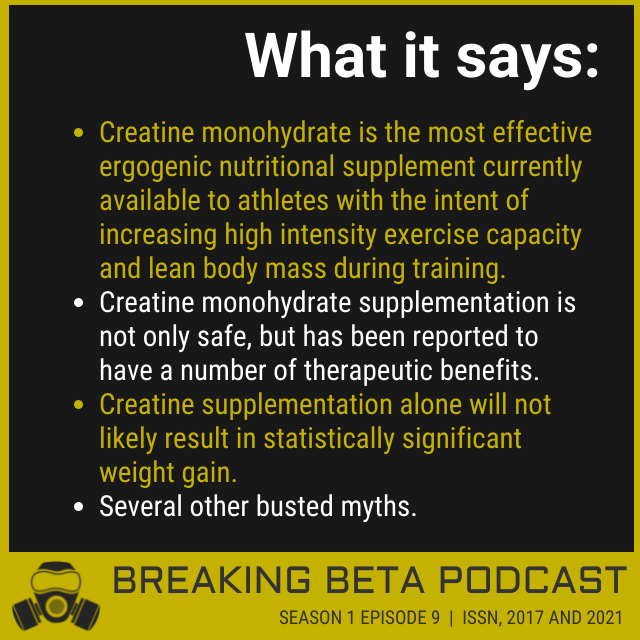
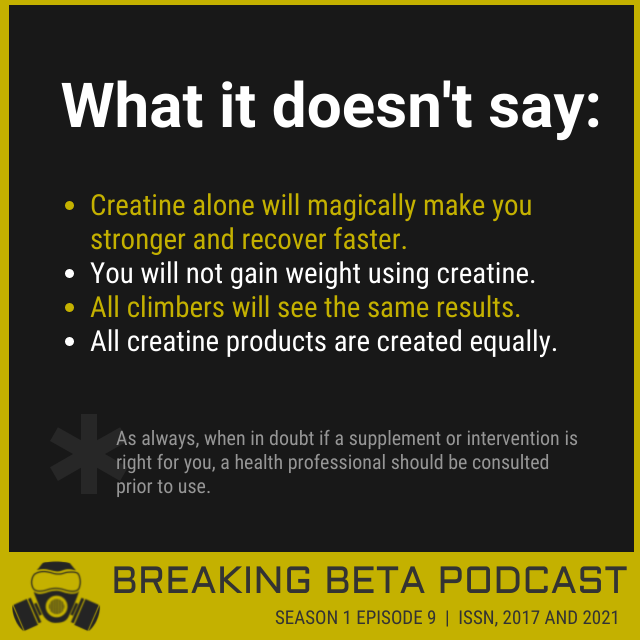

In this episode, Kris and Paul discuss two papers that try to clear up the rumors surrounding one of the most popular supplements in sports nutrition:
International Society of Sports Nutrition Position Stand: Safety and Efficacy of Creatine Supplementation in Exercise, Sport, and Medicine
authored by Richard B. Kreider, Douglas S. Kalman, Jose Antonio, Tim N. Ziegenfuss, Robert Wildman, Rick Collins, Darren G. Candow, Susan M. Kleiner, Anthony L. Almada, and Hector L. Lopez; published in the Journal of the International Society of Sports Nutrition in 2017.
And:
Common Questions and Misconceptions About Creatine Supplementation: What Does the Scientific Evidence Really Show?
authored by Jose Antonio, Darren G. Candow, Scott C. Forbes, Bruno Gualano, Andrew R. Jagim, Richard B. Kreider, Eric S. Rawson, Abbie E. Smith-Ryan, Trisha A. VanDusseldorp, Darryn S. Willoughby, and Tim N. Ziegenfuss; published in the Journal of the International Society of Sports Nutrition in 2021.
They’ll attempt to determine whether or not creatine really is the secret to getting swole, or if it’s just going to cause your kidneys to eventually fail. Tune in to find out if all those Olympians in the early ’90’s were really on to something, or just angling to get on GNC’s payroll.
New episodes of Breaking Beta drop on Wednesdays. Make sure you’re subscribed, leave us a review, and share!
And please tell all of your friends who cite those 1982 studies that say you'll look like a bodybuilder if you use creatine, not that that's necessarily a bad thing, that you have the perfect podcast for them.
Got a question? Comments? Want to suggest a paper to be discussed? Get in touch and let us know!
Breaking Beta is brought to you by Power Company Climbing and Crux Conditioning, and is a proud member of the Plug Tone Audio Collective. Find full episode transcripts, citations, and more at our website.
FULL EPISODE TRANSCRIPT:
Breaking Bad Audio Clip 00:05
Where is the laptop?
What the hell difference does it make? They got it. End of story. APD, Northwest Area Command on Second, they tagged it, they filed it. It's in the system, and they locked it in their evidence room.
Alright. Alright, so describe the building.
Ha...describe the...how about I describe Fort Knox. And what are you gonna do? Are you gonna put on your black leotard and go dangling on a clothesline? It's a building full of cops, what else do you need to know? And why in the hell am I talking to you?
Kris Hampton 00:45
I just want to say that the "Did you put on your black leotards and dangle from a clothesline?" should hurt all of you sport climbers. It should hurt you in a real place.
Paul Corsaro 00:57
Amazing.
Kris Hampton 00:58
That includes you too, Paul.
Paul Corsaro 01:00
Yeah, I guess I identify as a sport climber these days, so I felt it a little bit at least.
Kris Hampton 01:05
Yeah, it hurt a former me and the current me is The One Who Knocks, so
Paul Corsaro 01:10
Haha awesome.
Kris Hampton 01:12
So today is going to be a little bit different. Number one, this is the first time we've, throughout the entire season, that we've actually discussed the paper a little bit beforehand and we haven't really discussed the content of the paper as much as how to structure this episode because we're looking at two different creatine reviews and they're they're both kind of massive, so we had to figure out how to structure this thing.
Paul Corsaro 01:48
Yeah. There's a lot of information on here, I think. You know, over 500 studies in these two papers alone, which is a lot.
Kris Hampton 01:55
Yeah and one of them mentions that there are there are thousands of studies done on creatine, so.
Paul Corsaro 02:01
Yeah, I think it's the most researched supplement out there or if not the most, it's one of the most for sure. So, evidence based methods for supplementation, this is probably one of the first places you're going to look. And everyone knows about creatine, or has heard about it.
Kris Hampton 02:17
Yeah, totally. And I, you know, I think that the place we're starting is a really important place to start, especially with climbing being in the Olympics now and sport in general, and we're starting with a paper called "The International Society of Sports Nutrition Position Stand: Safety and Efficacy on Creatine Supplementation in Exercise, Sport and Medicine". A bunch of authors, I'm not even going to try it. It's Richard Kreider et al and these authors, what I gathered from the paper and this this will go with both papers, is that they're kind of a who's who of creatine research and investigation. The journal is the Journal of International Society of Sports Nutrition 2017. And the purpose of this review is to provide an update to the current literature regarding the role and safety of creatine supplementation in exercise, sport and medicine and to update the position stand of the International Society of Sports Nutrition related to creatine supplementation. And you know, the list that that these bodies, these governing bodies of sport, have to keep up with of supplements in order to ensure safety, to look at the efficacy is massive. So getting their gold seal here would be huge for creatine.
Paul Corsaro 03:54
And just from a competition perspective too, when you get to the higher levels you need to be careful about what supplements you take.
Kris Hampton 04:01
Exactly.
Paul Corsaro 04:01
You know, you could fail a drug test and whatever you place in this competition or whatever you win that could be taken away. So especially as climbing is moving into a more mainstream world of sport, I think more and more of the supplements that we're using or considering using need to kind of go this route to make sure everything's staying where it needs to be and not getting banned or titles stripped, things like that.
Kris Hampton 04:31
Yeah, I mean, Kyra Condie, one of our Olympic climbing athletes, I know is a creatine user, so I'm sure she was, you know, looking for this kind of thing. The second paper we're going to look at is "Common Questions and Misconceptions About Creatine Supplementation: What Does The Scientific Evidence Really Show?" Jose Antonio et al. A lot of the same authors on this paper. Same journal, the Journal of the International Society of Sports Nutrition. This one's more recent, 2021, and the purpose is to address the common miss... questions and misconceptions. An internationally renowned team of research experts who have collectively published over 200 peer-refereed articles involving creatine supplementation was formed to perform an evidence-based scientific evaluation of the literature. So we're, we're kind of going in heavy this time. Lots of lots of info in this episode.
Paul Corsaro 05:32
Yep, let's do it.
Kris Hampton 05:34
All right.
Breaking Bad Audio Clip 05:35
You clearly don't know who you're talking to, so let me clue you in.
Paul Corsaro 05:40
I'm Paul Corsaro.
Kris Hampton 05:41
I'm Kris Hampton.
Breaking Bad Audio Clip 05:42
Lucky two guys, but just guys, okay?
Paul Corsaro 05:46
And you're listening to Breaking Beta,
Kris Hampton 05:49
Where we explore and explain the science of climbing.
Kris Hampton 05:52
With our skills, you'll earn more than you ever would on your own.
Breaking Bad Audio Clip 05:57
We've got work to do. Are you ready?
Paul Corsaro 06:01
I just consumed about 500 grams of creatine. I'm ready to roll. Are you?
Kris Hampton 06:06
Hahaha. 500 grams is a lot, dude. You're you're ahead of me by 495 grams today.
Paul Corsaro 06:16
Haha. Well, you've got five grams in, so are you ready?
Kris Hampton 06:20
I'm ready. I am absolutely ready. Let's take a look at the methods.
Breaking Bad Audio Clip 06:25
In a scenario like this, I don't suppose it is bad form to just flip a coin.
Paul Corsaro 06:33
Cool. So this is a position stand. So this is one of the first places you'll look for evidence-based information about supplements or nutritional methods. The International Society of Sports Nutrition published this paper. They're a nonprofit organization that has their own journal, and really just focuses on the nutrition aspect of both sports performance, and there's health as well in there. So this paper had 253 citations and that's just a fraction of the many papers and research that has been done on creatine supplementation. So basically, what they do is they break down as best they can the body of research and finish the paper with some recommendations for how to use the supplement in question, which in this case is creatine.
Kris Hampton 07:23
Yeah, I really like this kind of paper. You know, it makes it quite easy as a reader, as a coach, as a an athlete, to look at it and get the actual suggestions out of it. You don't have to tease them out yourself. They're pretty much there and if you want to look deeper into one, you can and I think that's what we're gonna do today.
Paul Corsaro 07:47
Yep.
Kris Hampton 07:49
Let's just jump right into what it says.
Breaking Bad Audio Clip 07:52
Whatever you think is supposed to happen, I'm telling you the exact reverse opposite of that is going to happen.
Kris Hampton 07:59
Alright, let's take these one by one, I think. I'll just....I'll start and we can kind of go back and forth on what their suggestions are here and, you know, kind of talk a little more about each one. How's that sound to you?
Paul Corsaro 08:14
Let's do it. Sounds great.
Kris Hampton 08:16
Alright, so after reviewing the scientific and medical literature, the International Society of Sports Nutrition concludes the following in terms of creatine supplementation as the official position of the society: #1, creatine monohydrate is the most effective ergogenic nutritional supplement currently available to athletes with the intent of increasing high intensity exercise capacity and lean body mass during training.
Paul Corsaro 08:43
Yeah, and that's pretty backed up. They cite a bunch of different studies that are done here and it pretty much improves performance across the board on almost everything that's been looked into for both exercise and sports performance. So the evidence is, the evidence is there for sure.
Breaking Bad Audio Clip 09:02
Yeah science!
Kris Hampton 09:03
I think that's...I think climbers should absolutely be looking at that and taking it into consideration.
Paul Corsaro 09:10
Yep. So creatine monohydrate supplementation is not only safe, but has been reported to have a number of therapeutic benefits in healthy and diseased populations, ranging from infants to the elderly. There's no compelling scientific evidence that the short or long term use of creatine monohydrate, up to 30 grams a day for five years... I guess I'm a little over with that 500 grams.... has any detrimental effects on otherwise healthy individuals or among clinical populations who may benefit from creatine supplementation.
Breaking Bad Audio Clip 09:38
We use a different chemical process, but it is every bit as pure.
Kris Hampton 09:41
Yeah, I think the the safety of it is important, right? I consider, and I think we all should consider, everything we're putting into our bodies. You know, we shouldn't just jump onto a supplement because your friend said it. And the amount of evidence here is overwhelming. And the up to 30 grams a day, that's well over the the recommended dosage. Well under the the Paul dosage of 500 grams. But that's well under. And that's, you know, that study looked at it for five years, so seems safe to me and I can't argue with that.
Breaking Bad Audio Clip 10:25
Boo yah! Woo!
Paul Corsaro 10:27
I will say, especially when you start talking about, you know, therapeutic and medical uses of creatine, definitely talk to someone who's licensed in nutrition.
Kris Hampton 10:37
Absolutely.
Paul Corsaro 10:38
Yeah, I try, I'm a pretty big proponent of staying within my scope of performance and movement, so I always get a little nervous when we get into the medical side of things. So please see someone with doctor in front of their name or someone who's licensed to practice clinical nutrition if you're considering using supplements for health and medical reasons.
Kris Hampton 10:57
Yeah.
Paul Corsaro 10:57
Here's my disclaimer.
Kris Hampton 10:59
Appreciate that. Number three, if proper precautions and supervision are provided, creatine monohydrate supplementation in children and adolescent athletes, we're going into that realm again, is acceptable and may provide a nutritional alternative with a favorable safety profile to potentially dangerous anabolic androgenic drugs. However, we recommend that creatine supplementation only be considered for use by younger athletes who A, are involved in serious competitive supervised training, B, are consuming a well balanced and performance enhancing diet, C, are knowledgeable about appropriate use of creatine and D, do not exceed recommended dosage. I'm glad they included the are consuming a well balanced performance enhancing diet here. I think that should be the first step for everybody, not just kids.
Paul Corsaro 11:49
Yeah
Kris Hampton 11:49
But backing up to what you said, you know, if you're a youth athlete, or a coach who's working with youth athletes, don't take it from us. Talk to talk to the medical professionals.
Paul Corsaro 12:01
And there's going to be creatine in animal protein if, you know, that fits within your dietary.....
Kris Hampton 12:09
Restrictions
Paul Corsaro 12:10
Restrictions. Thank you. So you know, you're gonna get some creatine there. It could be useful if say, animal protein and red meat doesn't fit within your dietary restrictions. So this could be something to really consider to make sure we're getting all those micronutrients and getting the creatine in our diet, which because it has a pretty important role in our metabolism and energy production, so it's definitely important to get it in somehow. So this could be a method if you can't get it otherwise.
Kris Hampton 12:37
Yeah, I think that, you know, we didn't really go into what creatine is or what it does and I think, you know, we could do a whole season of a podcast on just that. But essentially, we all have creatine stores and they're extremely beneficial for recovery and for athletics in general. So if we need more of it, then that's where the supplement comes in. Number four for you?
Paul Corsaro 13:09
So label advisories on creatine products that caution against usage by those under 18 years old, while perhaps intended to insulate their manufacturers from legal liability, are likely unnecessary given the science supporting creatine safety, including children, including in children and adolescents.
Kris Hampton 13:27
Yep. Back to that. If you're if you're working with kids, don't take it from us.
Paul Corsaro 13:31
Yeah.
Kris Hampton 13:32
But I do think that's worth talking about. Like the labels on a lot of these products, the legal teams are going to drastically, you know, change what that label is allowed to say, for any company, so we can't necessarily take the label at face value all the time.
Paul Corsaro 13:53
Yeah. And a lot of those labels, the wording can make it seem like there could be some serious dangers to using certain supplements, when really, it's just being protective. So it's that's why it's useful to have these positions stands to dig a little deeper and find what the science really says for these.
Kris Hampton 14:12
Yeah, totally. I mean, I think I bought some furniture the other week that causes cancer if you live in California, so.
Paul Corsaro 14:18
Haha that's like everything out there has that label, I believe, right?
Kris Hampton 14:22
Haha. Yeah. All right. At present, creatine monohydrate is the most extensively studied and clinically effective form of creatine for use in nutritional supplements in terms of muscle uptake and ability to increase high intensity exercise capacity. Important if you if you are climbing a lot, training a lot. You know, it's having the energy to to do that in an effective way isn't only going to mean that you send more. It's also going to mean that you're reducing your risk of injury, you're recovering faster, so, for me, that's a big win.
Paul Corsaro 15:05
Yeah, a couple cool things I noticed when going through this was they cited a couple papers where it helped mitigate some of the soreness that came from heavy increases in training loads. So it could be useful coming into, you're doing a final peak for a trip or the end of the season and you want to handle that increased volume of training without feeling just absolutely destroyed, this could be helpful for that. Another backed up benefit of creatine was when injuries occurred and limbs or muscles were immobilized, it helped reduce some of the atrophy or losses in strength.
Kris Hampton 15:48
Yeah
Paul Corsaro 15:48
So it could kind of hedge your bets if say you're you're on the sidelines for a little bit and you can't use certain aspects of movement or your body. This could help reduce that drawback or diminishing effect when you are
Kris Hampton 16:02
Yeah, totally
Paul Corsaro 16:02
Yeah.
Kris Hampton 16:03
And you know, a lot of people, especially in America, have like two week vacations and they end up with these quick climbing trips where they're trying to pack in a lot of climbing in a short amount of time and they don't have the ability to train in blocks where they're climbing three days in a row. So for me, it's a big win if I have a supplement in place that can help me recover a little faster and handle more load. I'm going to be able to get more climbing in. I'm going to feel more fresh on, you know, third day on and I'm just coming off a trip to Vegas, bouldering, where I experienced exactly that.
Paul Corsaro 16:48
Nice.
Kris Hampton 16:48
You know, I sent I sent my hardest boulder of the trip third day on and I haven't climbed three days in a row in.... I can't tell you when the last time I climbed three days in a row was.
Paul Corsaro 16:58
So yeah, moving on. The addition of carbohydrate or carbohydrate and protein to a creatine supplement appears to increase the muscular uptake of creatine, although the effect on performance measures may not be greater than using creatine monohydrate alone.
Kris Hampton 17:13
Yeah, I sort of like it whenever research brings carbohydrates into the conversation. They've been unfairly demonized by a lot of people, I think. So I just appreciate the mention of saying, you know, using a carbohydrate might make this more effective.
Paul Corsaro 17:32
Yeah, and it doesn't, it doesn't look like there is any research out there that shows that adding that carbohydrate or protein to the supplement causes any noticeable decrease in the effectiveness too, so if that makes your supplementation routine a little bit easier to combine them, I think that's a good point to notice, is that we can simplify or make things more efficient. You don't have to take eight shakes a day or something like that.
Kris Hampton 17:58
Right. Alright, the quickest method of increasing muscle creatine stores may be to consume three grams per kilo......three grams per kilogram of body weight, it doesn't say that there, but that's what it means, a day of creatine monohydrate for five to seven days following the three to five grams a day thereafter to maintain elevated stores. Initially ingesting smaller amounts of creatine monohydrate, for example three to five grams a day, will increase muscle creatine stores over a three to four week period. However, the initial performance effect of this method of supplementation is less supported. So this is just talking about the popular like loading phase of loading up on a little more for five to seven days, actually quite a bit more for five to seven days, and then going into your just three to five grams a day versus three to five grams a day, period. I personally follow the three to five grams a day. I don't do the loading phase and and I find it works just fine for me.
Paul Corsaro 19:07
Yep, I think one and we... I may be pulling this over from the misconceptions paper, because a lot of these points we're going to talk about today do overlap a bit.
Kris Hampton 19:15
Yeah.
Paul Corsaro 19:16
I think one of the points about these two different loading protocols, one where you do load up heavily and then kind of go to maintenance and then one where you just keep a consistent smaller amount, I believe the heavy loading in the front increased the timeline of getting that maximum level of creatine storage in the muscle.
Kris Hampton 19:34
Mm hmm it did.
Paul Corsaro 19:34
So, you know, that may be something to consider if you have a trip coming up or you do have some time constraints in the near future. You might get a little more bang for the buck with the heavier loading method.
Kris Hampton 19:45
Absolutely.
Paul Corsaro 19:47
Next one. Clinical populations have been supplemented with high levels of creatine monohydrate .3 to .8 grams per kilogram of bodyweight a day, equivalent to 21-56 grams a day for a 70 kilogram individual, for years with no clinically significant or serious adverse effects.
Kris Hampton 20:04
Yeah, I don't know if there's been a study into your 500 grams that you've had today.
Paul Corsaro 20:09
Haha. N equals one.
Kris Hampton 20:10
Haha yeah. You're an n of one and maybe your study is only a one day thing, but we'll know in a couple of weeks how it turns out. We'll let you guys know.
Paul Corsaro 20:20
It's a good thing we're finishing this season today, in case I'm not around tomorrow.
Kris Hampton 20:23
Hahaha. And further research is warranted to examine the potential medical benefits of creatine monohydrate and precursors, like,....uh I didn't look at this word.
Paul Corsaro 20:35
Preview!
Kris Hampton 20:36
Guanidinoacetic acid on sport health and medicine. Haha. Guanidinoacetic acid. This sounds like something from Jurassic Park.
Paul Corsaro 20:44
Right.
Kris Hampton 20:44
And, you know, frankly, I'm a fan of any paper that finishes with "Further research is warranted." Like we've said before, we like how science works.
Paul Corsaro 20:56
Yep. Always further research, always forward.
Kris Hampton 20:59
Alright, that's the ISSN stance on creatine. So they're finding it safe. They're finding it effective. They're suggesting its usage for athletes. Let's take a quick commercial break, and we'll come back and talk about some of the questions and misconceptions around creatine.
Breaking Bad Audio Clip 21:19
Please. Alright, I really need a break here. Okay.
Lana Stigura 21:24
So despite the fact that the show is all about science, most of us, including Kris and Paul, aren't just one dimensional rock climbers that only care about the data. There's so much more to this sport.
Breaking Bad Audio Clip 21:33
Okay, but say, you know, just for the sake of argument
Lana Stigura 21:36
That's why we're a proud member of the Plug Tone Audio Collectivelo, alongside founding member podcasts Sends and Suffers, The Power Company Podcast and the American Climbing Project. From building community and tackling tough conversations, to sharing spray about exciting recent sends, we've got it all. Rooted in climbing and expanding outward. You can find more of our shows by searching for Plug Tone Audio in your preferred podcast app, or by visiting us at the link in your show notes. And as always, please share your favorite episodes with your friends. Oh, and did I mention that we're constantly growing, with new podcasts being added all the time? So keep an eye out....or an ear out...for new shows soon.
Breaking Bad Audio Clip 22:15
Let's all get back to worl for Christ's sake, okay?
Kris Hampton 22:18
All right, we are back from commercial break and we're looking at some of the questions and misconceptions that we all have when it comes to creatine.
Breaking Bad Audio Clip 22:29
Whatever you think is supposed to happen, I'm telling you the exact reverse opposite of that is going to happen.
Kris Hampton 22:37
Alright, I'm about to let the cat out of the bag a little bit here, Paul.
Paul Corsaro 22:40
Do it.
Kris Hampton 22:41
Here's how we're going to structure this section. I'm going to be asking the questions and then I'll let you read their answer and then we can talk about the ones that sort of make the most sense to discuss in terms of climbers and athletes in general. And the reason I'm letting the cat out of the bag is because at some point, we're going to be doing some Better Call Paul episodes where Paul is answering questions, particularly yours. So let's start with "Does creatine lead to water retention?"
Paul Corsaro 23:16
So in summary, while there is some evidence to suggest that creatine supplementation increases water retention, primarily attributed to increase in intracellular volume over the short term, there are several other studies suggesting it does not alter total body water intra or extra cellular relative to muscle mass over longer periods of time. As a result, creatine supplementation may not lead to water retention. So what we're doing as we kind of go through this, we're kind of reading the conclusion for each section, and then we'll talk about it. So that's kind of why this is a little bit longer, a little more specific wording. So we're just pulling this straight from the paper.
Kris Hampton 23:51
Yeah. And, you know, my thought here and, you know, they they discuss it in this paper as well, is that this myth comes from all of those, that early research, you know, that was done decades ago, that showed this water retention based on using 20 grams a day for for six days or so. And that's quite a bit more than the recommended.... if you're following the, you know, the three to five grams a day. So there there could be still some, some water retention that's noticeable if you're doing that loading protocol, but it's hard to separate that from "Is it muscle mass that we're gaining?" or "Is it water that we're holding?", unless you're doing a study. If it's just you, and you're like, "Oh I've gained some weight. I must be taking on water", I don't know if we can make that claim.
Paul Corsaro 24:53
And it seems to be pretty short term, right?
Kris Hampton 24:55
Right.
Paul Corsaro 24:56
It kind of seems to level out over a period of time, so. Yep. Cool.
Kris Hampton 25:02
All right. Next question. Is creatine an anabolic steroid?
Paul Corsaro 25:06
So in summary, because creatine has a completely different chemical structure, it is not an anabolic steroid.
Kris Hampton 25:12
I don't know that we need to go too much more into that.
Paul Corsaro 25:15
Yep.
Kris Hampton 25:16
I don't know what the chemical structure of these things are, so I'm fine if, if this journal and this review is saying it's not a steroid.
Paul Corsaro 25:28
Yeah, I think the important distinction here is the physiological and performance outcomes of steroids and creatine can be similar. You can perform better, you can recover faster. The mechanism's action, like like was just mentioned, so it's different chemically. But also, it's legal categorization is different, too. And I think that's really important when you get into competition as well. As long as it's allowed and safe, which the evidence shows, and you can use it to help your performance, it's a viable pathway.
Breaking Bad Audio Clip 25:58
We use a different chemical process, but it is every bit as pure.
Kris Hampton 26:01
Exactly.
Paul Corsaro 26:02
Oh, that's a perfect one.
Kris Hampton 26:06
I work hard over here with these samples, Paul. Haha. Does creatine cause kidney damage or renal dysfunction?
Paul Corsaro 26:15
In summary, experimental and controlled research indicates that creatine supplementation when ingested at recommended dosages does not result in kidney damage and/or renal dysfunction in healthy individuals.
Kris Hampton 26:27
Yeah, so recommended dosages, not the 500 grams a day that Paul is on today.
Paul Corsaro 26:35
And I think this continues with the theme of a lot of these misconceptions come from earlier research. I think the big one this came from was a case study that was published in '98 with a young male who had kidney disease as well. I think some of the markers were declining while he underwent creatine supplementation. And I think they've pretty consistently done some research trials about creatine, some supplementation and kidney and renal function has actually increased and overall improved. So I think a lot of this initial case study misconception has been pretty strongly negated.
Kris Hampton 27:14
Yep, I think so. Does creatine cause hair loss or baldness?
Paul Corsaro 27:19
In summary, the current body of evidence does not indicate that creatine supplementation increases total testosterone, free testosterone, DHT or causes hair loss and baldness
Breaking Bad Audio Clip 27:31
You're at the end of round one. I'm going to recommend cautious optimism. You'll start feeling better soon, more like yourself. And your hair should start to come back.
Paul Corsaro 27:39
Haha. Yes.
Kris Hampton 27:41
You and I can't comment on this because both of us are either bald, going bald, by choice or not.
Paul Corsaro 27:49
My future is very apparent when you look at my relatives.
Kris Hampton 27:52
Haha. Hair apparent.
Paul Corsaro 27:54
Haha
Kris Hampton 27:57
All right. Does creatine lead to dehydration and muscle cramping?
Paul Corsaro 28:00
Actually, can we go back to the hair loss thing real quick?
Kris Hampton 28:03
Yeah, let's do it.
Paul Corsaro 28:04
I just figured we'd highlight.... again, this came from an initial study that was done in the past where some rugby players and they saw an increase in the DHT or dihydrogen testosterone over time. That study however, has not been replicated. So they tried to replicate it and they couldn't. So again, maybe this study that led to this initial misconception wasn't on solid ground or just couldn't be replicated, so.
Kris Hampton 28:30
And this is one of the dangers of you know, looking at one study, making a decision based on that one study and then never checking back in with the research again. So, use use science how it's used. That's the best way to go about it.
Paul Corsaro 28:47
Indeed.
Kris Hampton 28:48
Alright, does creatine lead to dehydration and muscle cramping?
Paul Corsaro 28:51
In summary, experimental and clinical research does not validate the notion that creatine supplementation causes dehydration and muscle cramping.
Kris Hampton 29:00
It's interesting to me and you know, I know this is not exactly how it works, but it's interesting to me that we would be afraid of water retention and dehydration all at the same time.
Paul Corsaro 29:10
Yeah, right. Um, a previous study that caused this misconception. They used 52 football players, and 25% of those reported incidences of muscle cramping and 13.5% reported symptoms of dehydration. However, the studies failed to control for the use of other supplements and the dosage of creatine ingested, so another not super solid study leading to these misconceptions, and they're still around today, but again, it's been proved that this is not the case.
Kris Hampton 29:40
Yeah, the that kind of thing seems like it's rampant and when something is as widely studied as creatine, if you come across one of those studies, it's pretty easy to go deeper into that rabbit hole and see what other studies are saying.
Paul Corsaro 29:54
And then a study after that, 72 athletes, collegiate football players and they actually had better or I guess, instances of cramping, dehydration, tightness, muscle strains, all that. So it's looking like it's actually the opposite.
Kris Hampton 30:10
So maybe when you're putting on your tight ass climbing shoes, creatine will help your feet not cramp up over and over and over.
Paul Corsaro 30:17
That is the worst, isn't it?
Kris Hampton 30:18
Haha. It's the worst. I hate it. All right, is creatine harmful for children and adolescents?
Paul Corsaro 30:26
In summary, based on the limited evidence, creatine supplementation appear safe and potentially beneficial for children and adolescents.
Kris Hampton 30:33
Yeah, one of those that, you know, overlaps a little bit with the ISSN stance. And like I said before, if you're working with youth athletes don't take our word for it. Do your own research. Talk to professionals.
Paul Corsaro 30:47
Very much so.
Kris Hampton 30:49
Alright, does creatine increase fat mass?
Paul Corsaro 30:53
In summary, creatine supplementation does not increase fat mass across a variety of populations. This one's yeah, pretty straightforward. They've done a couple longer duration studies. I think there's one that's like five years plus where they didn't see any of this.
Kris Hampton 31:06
Up to two years I think is what it says in this one.
Paul Corsaro 31:09
Okay.
Kris Hampton 31:09
Yeah it says, "However, randomized controlled trials one week to two years in duration, do not validate this claim."
Paul Corsaro 31:15
Okay, cool. Yeah.
Kris Hampton 31:17
Is a creatine loading phase required?
Paul Corsaro 31:20
In summary, accumulating evidence indicates that you do not have to load creatine. Lower daily dosage of creatine supplementation, for example, three to five grams a day, are effective for increasing intramuscular creatine stores, muscle accretion and muscle performance and recovery.
Kris Hampton 31:36
Yep and we've talked about this a little bit. The loading phase might be beneficial for getting the effects a little faster, but certainly not required.
Paul Corsaro 31:46
Yeah.
Kris Hampton 31:47
Is creatine beneficial for older adults?
Paul Corsaro 31:50
In summary, there's a growing body of evidence showing that creatine supplementation, particularly when combined with exercise, provides musculoskeletal and performance benefits in older adults.
Kris Hampton 32:01
Yeah, you know, this one, I think is especially pertinent for climbers. This is one of the sports where you can continue enjoying the sport, pushing yourself into whatever age you're interested in doing that in. And they mentioned that, you know, one of the things that's scary for older athletes is age-related sarcopenia. So essentially, it's a skeletal muscle condition of loss of muscle mass, strength and muscle functionality and there's some evidence saying that creatine can combat that, particularly when used in conjunction with exercise.
Paul Corsaro 32:45
Yeah, and that's, you know, that's maintaining that muscle mass is huge for daily life and for performance. So I think that's a really interesting and exciting thing to look at there.
Kris Hampton 32:54
Yeah, and muscle mass, you know, is, is safety. Strength is safety. And any injury when you're an older athlete is is going to be a much bigger deal than when you were 19 years old. So for me, the fact that I'm able to stay stronger, be safer, not be as vulnerable to injury, muscle injury, that's a big win.
Paul Corsaro 33:23
Yep, absolutely.
Kris Hampton 33:25
Is creatine only useful for resistance power type activities?
Paul Corsaro 33:29
In summary, there's a variety of athletic events, not just resistance power activities, which may benefit from creatine supplementation
Breaking Bad Audio Clip 33:37
Power everything,
Kris Hampton 33:38
Power everything. That's what I'm all about.
Paul Corsaro 33:41
All the things.
Kris Hampton 33:41
You sport climbers may not need it, but I do. And so basically, this, this can benefit more than just these like super powerful, strength-based sports. So sport climbers, you can use this.
Paul Corsaro 33:58
And I think we've touched on this a couple times. Like one of the big things it's looking like with creatine is the recovery. You know, you're less sore, less muscle damage, less inflammation, so that can lead to
Kris Hampton 34:08
So you can do more training, more of your sport.
Paul Corsaro 34:11
Exactly. And just yeah, more performance on trips, just getting more work in which can be really, really useful for improving performance.
Kris Hampton 34:22
Is creatine only effective for males?
Paul Corsaro 34:25
In summary, there's accumulating evidence that creatine supplementation has the potential to be a multifactorial therapeutic intervention across the lifespan in females with little to no side effects.
Kris Hampton 34:36
Yeah, I didn't look to see what any of the side effects were here, since it says little to no.
Paul Corsaro 34:43
Yeah, they talked about some pregnancy and hormonal cycle things. Again, it's not my wheelhouse really, for the medical side of things, so I just kind of skimmed over that. I did, they did look at a couple of performance measures in purely female studies and they showed similar things that we'll see with, you know, other full studies where they're looking at a mix of people, but it improves sprint and agility performance, upper body exercise capacity, strength and power. So, yeah, it's effective for everyone.
Kris Hampton 35:20
Yeah, and I think it's important to, you know, notice things like females have been reported to have lower levels of creatine in the frontal lobe, so this can help increase that. You mentioned that they talk a little about pregnancy here and reduced creatine levels in late pregnancy has been associated with low fetal growth. So it's sounding like it...and again, we're not medical professionals, so talk to the doctors....but it's sounding like it's not only a safe thing, but could be a beneficial thing.
Paul Corsaro 35:57
Yep, indeed.
Kris Hampton 35:58
All right. Last one here. Are other forms of creatine similar or superior to monohydrate and is creatine stable in solutions, beverages?
Paul Corsaro 36:08
In summary, while some forms of creatine may be more soluble than creatine monohydrate when mixed in fluid, evidence based research clearly shows creatine monohydrate to be the optimal choice.
Kris Hampton 36:19
And I think that's the most common, you know, that we're seeing. You know, maybe if you're going on Amazon trying to buy the cheapest creatine available, you should be paying attention to are you getting creatine monohydrate. But I think any respectable company is going to be supplying you with creatine monohydrate in most cases.
Paul Corsaro 36:40
And I think a good resource for a lot of supplements is actually examine.com. Have you heard of them?
Kris Hampton 36:46
I haven't.
Paul Corsaro 36:46
So yeah, it's basically it was founded as a third party research and vetting organization or resource for supplements so you know what's in it. You know, because a lot of claims are made on some of these supplement bottles. So that could be a good starting, starting point to find quality supplements as well. And you know, we both get supplements from various companies that we like as well. But yeah, I think they mentioned in the paper, so creatine salts or like creatine complexes, they're often marketed as more effective sources of creatine than creatine monohydrate. But per this paper, there are no peer-reviewed published papers showing that the ingestion of creatine salts or other forms of creatine, increased creatine storage in muscle to a greater degree than creatine monohydrate.
Kris Hampton 37:33
Yeah, marketing is scary shit, man, so.
Paul Corsaro 37:38
Indeed.
Kris Hampton 37:38
Definitely don't just take the ad's word for it when you're looking at things and I'll make sure to have a link to examine.com in the show notes for folks who want to go and check it out.
Paul Corsaro 37:48
Yep.
Kris Hampton 37:50
All right. Real quick, what does this paper not say or how can it be, you know, easily misinterpreted?
Breaking Bad Audio Clip 37:59
What is close? There's no close in science Barry. There are right answers and wrong answers.
Breaking Bad Audio Clip 38:06
Yeah, but I'm just saying, Mr. White.
Kris Hampton 38:09
Number one, what it doesn't say is that you won't gain weight. It's not saying that. That's something I hear pretty often, "I don't want to gain weight on creatine" and this is not saying that you won't. You may indeed, and I have. But for me, though, the weight and the power associated with it,
Breaking Bad Audio Clip 38:30
Power, everything
Kris Hampton 38:32
Greatly improves my climbing versus the weight decreasing my climbing.
Paul Corsaro 38:39
Yeah, um, I think another thing it doesn't say is that everyone will have these same results too.
Paul Corsaro 38:47
So you know, as with anything, your mileage is gonna vary. We're all different. So, yeah, you're everyone's not going to have exactly the same result and have wildly beneficial or negligible gains from creatine. It's really just, it's safe to try.
Kris Hampton 38:47
Right.
Kris Hampton 39:04
Yeah.
Paul Corsaro 39:04
Evidence backs it up. It's worth giving a shot and seeing how you respond.
Kris Hampton 39:08
Yeah, exactly. I think that's important with every study to consider, you know. They're looking at, there's 253 citations in this paper, so they're looking at a lot of different studies, a lot of different groups of people, but you may have some factor that doesn't match up with any of these groups. And, you know, you should, you should feel okay giving it a try, and then making your own decisions from there. Alright, let's talk real quick about the applications and how we might use it as coaches and as athletes.
Breaking Bad Audio Clip 39:43
All these little pieces are part of the story, right? But they don't mean much on their own. When you start telling me what you know, we start filling in the gaps. I'll have them in lockup before the sun goes down.
Kris Hampton 39:55
Despite your 500 gram loading day today, do you use creatine?
Paul Corsaro 40:01
Haha. I actually don't, I've never used creatine. I have been lucky that I recover fairly quickly and I'm just around strength training quite a bit, so I'm always addressing that and I'm lucky that I could always be stronger. But I haven't really felt like I haven't been able to handle the training load myself or other coaches have prescribed for me, so I haven't used it. But I have athletes who do and I'm all about it.
Kris Hampton 40:28
Yeah, I hadn't used it. I tried it when I was in my 20s and I tried the loading protocol, and I was lifting a bunch and training a bunch and I gained a bunch of weight immediately, and I was really prone to putting on mass back then anyway. So So I gained a bunch of mass, because I just overdid the training and overdid the creatine and then I didn't use it for a long time. And actually, the first time I started using it, and was starting to feel the effects was when you came out here, and I hugely credit creatine, at least in part, to the fact that I was able to get on the Rodeo Wave and do routes that previously just felt impossible to me and do them relatively quickly. My, my power felt like it was way up from where it had been in the past,
Breaking Bad Audio Clip 41:26
Power everything
Kris Hampton 41:27
And I was able to recover in between sessions and get some things done, you know. So I've continued to use it. And I personally, I use Gnarly, which is a creatine monohydrate. It's certified safe for sport, and I use the recommended five grams a day with no loading protocol, like I've mentioned before. So and for me, as an aging athlete, I think that works out well and I would I would recommend any of my aging climbers, or climbers, frankly, who have trouble putting on muscle or gaining strength, I think this is a really safe thing for them to experiment with and see if it helps.
Paul Corsaro 42:13
Yeah, it's got it's got a shit ton of evidence behind it. It's it's, it's worth it. Check it out.
Kris Hampton 42:20
Yeah. All right. You can find both Paul and I all over the internets by following the links in your show notes. You can find Paul at his gym, Crux Conditioning in Chattanooga. If you have questions, comments, or papers you'd like for us to take a look at and like I said, we're coming with those Better Call Paul episodes. Just cat out of the bag there, so you have questions, let us know. Hit us up at community.powercompanyclimbing.com. Don't forget to subscribe to the show. Hit the Follow button on Spotify. Leave us a review. And please, tell all of your friends who cite those 1982 studies that say you'll look like a bodybuilder if you use creatine, not that that's necessarily a bad thing, that you have the perfect podcast for them. We'll see you next week when we discuss once again hangboard protocols and which ones will make you magically stronger and have more endurance.
Paul Corsaro 43:14
Can't wait.
Breaking Bad Audio Clip 43:16
It's done.
Breaking Bad Audio Clip 43:17
You keep saying that and it's bullshit every time. Always. You know what? I'm done. Okay, you and I, we're done.
Kris Hampton 43:29
Breaking Beta is brought to you by Power Company Climbing and Crux Conditioning and as a proud member of the Plug Tone Audio Collective. For transcripts, citations more visit powercompanyclimbing.com/breakingbeta.
Breaking Bad Audio Clip 43:42
Let's not get lost in the who, what and whens. The point is we did our due diligence.
Kris Hampton 43:48
Our music, including our theme song, "Tumbleweed", is from legendary South Dakota band Rifflord.
Breaking Bad Audio Clip 43:54
This is it. This is how it ends.








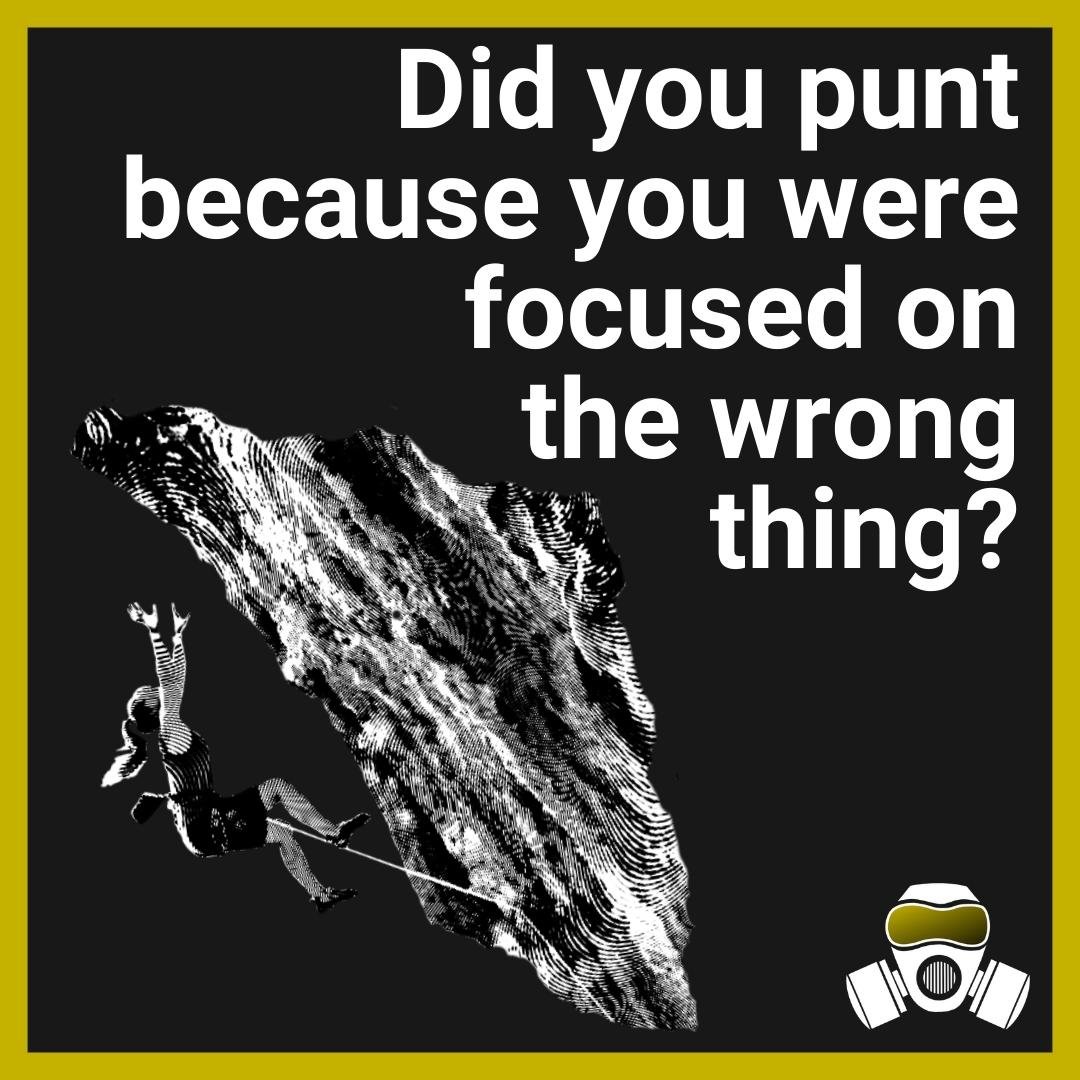



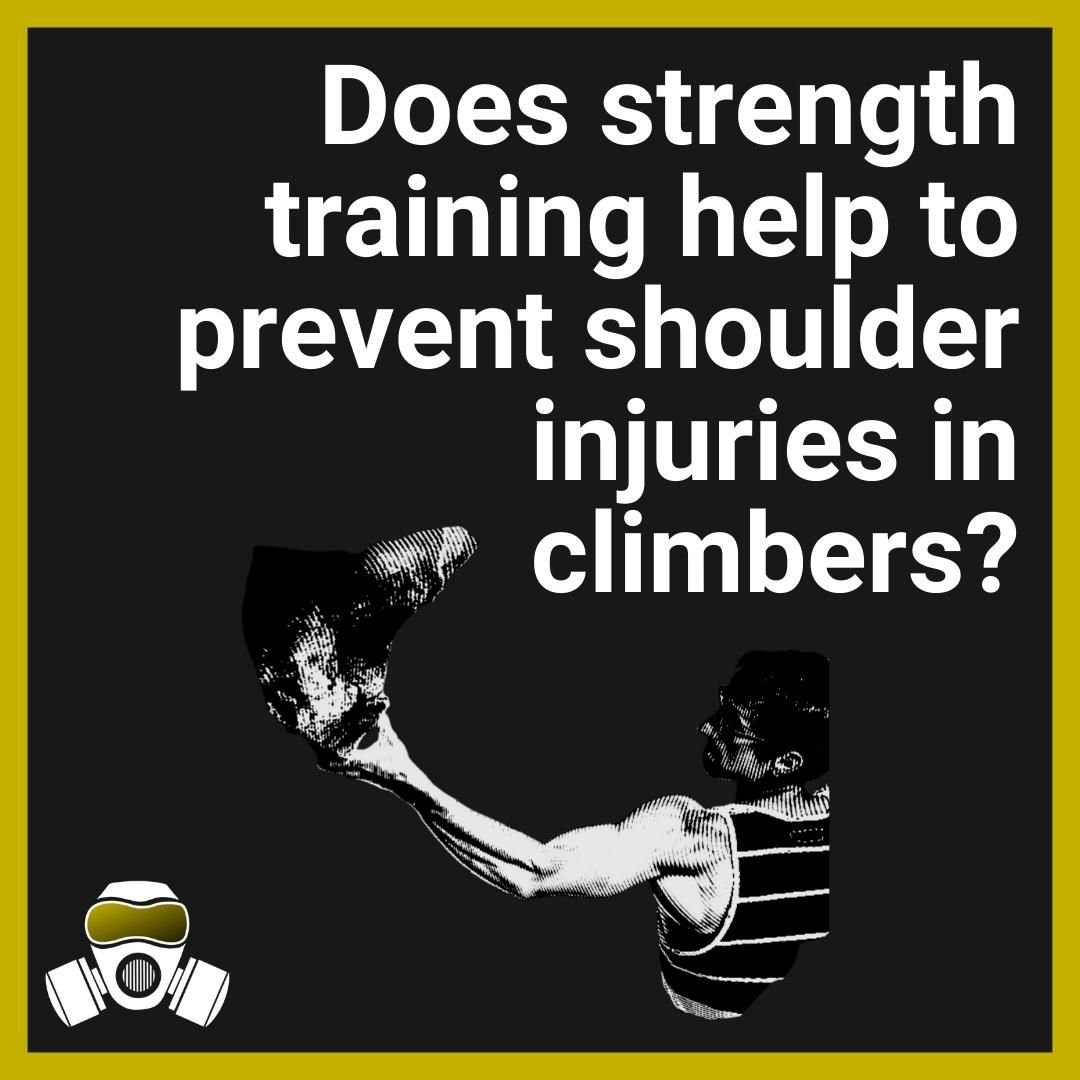











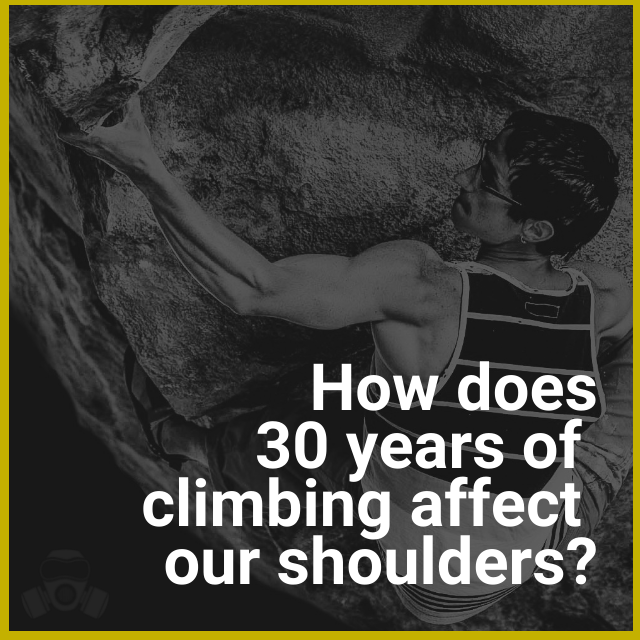





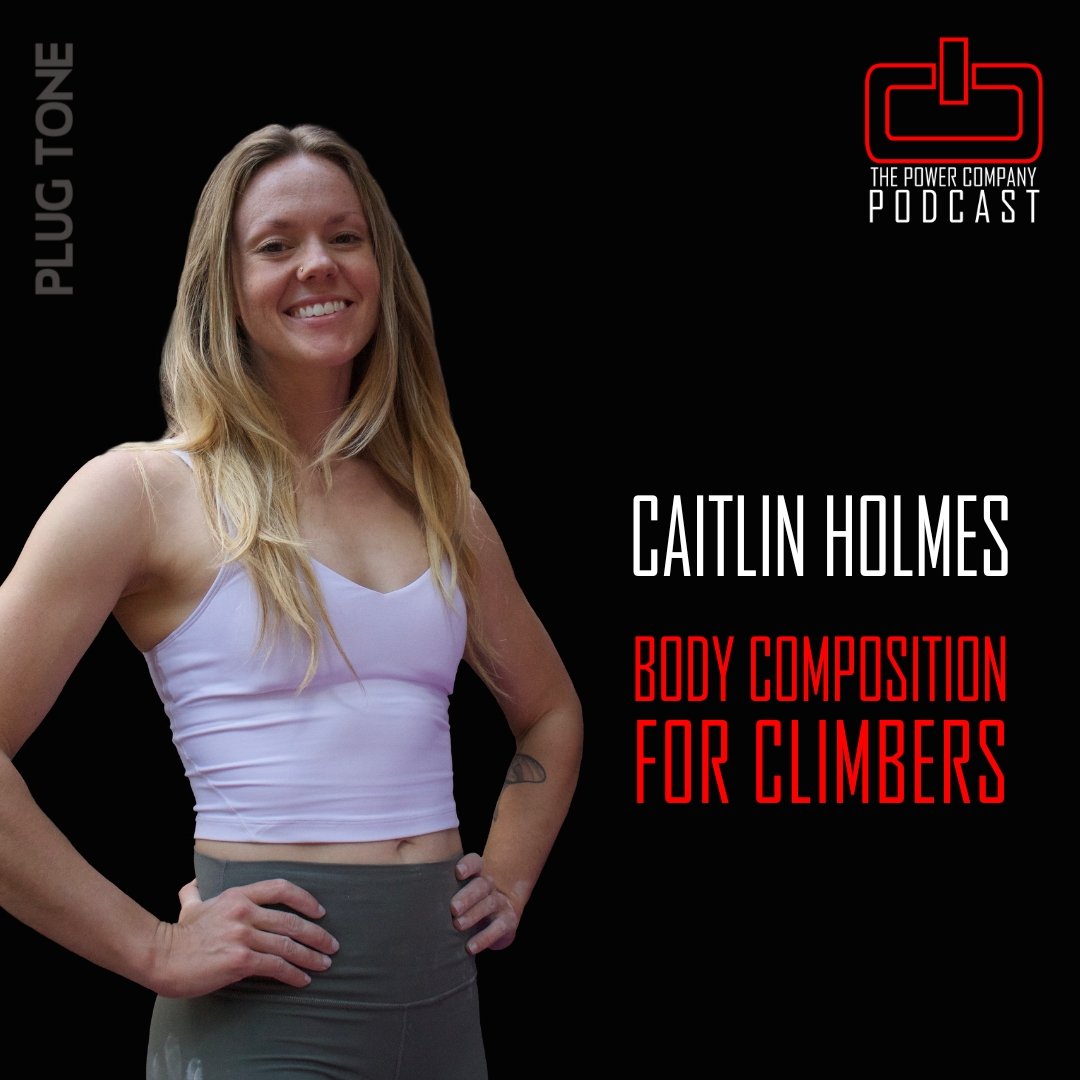
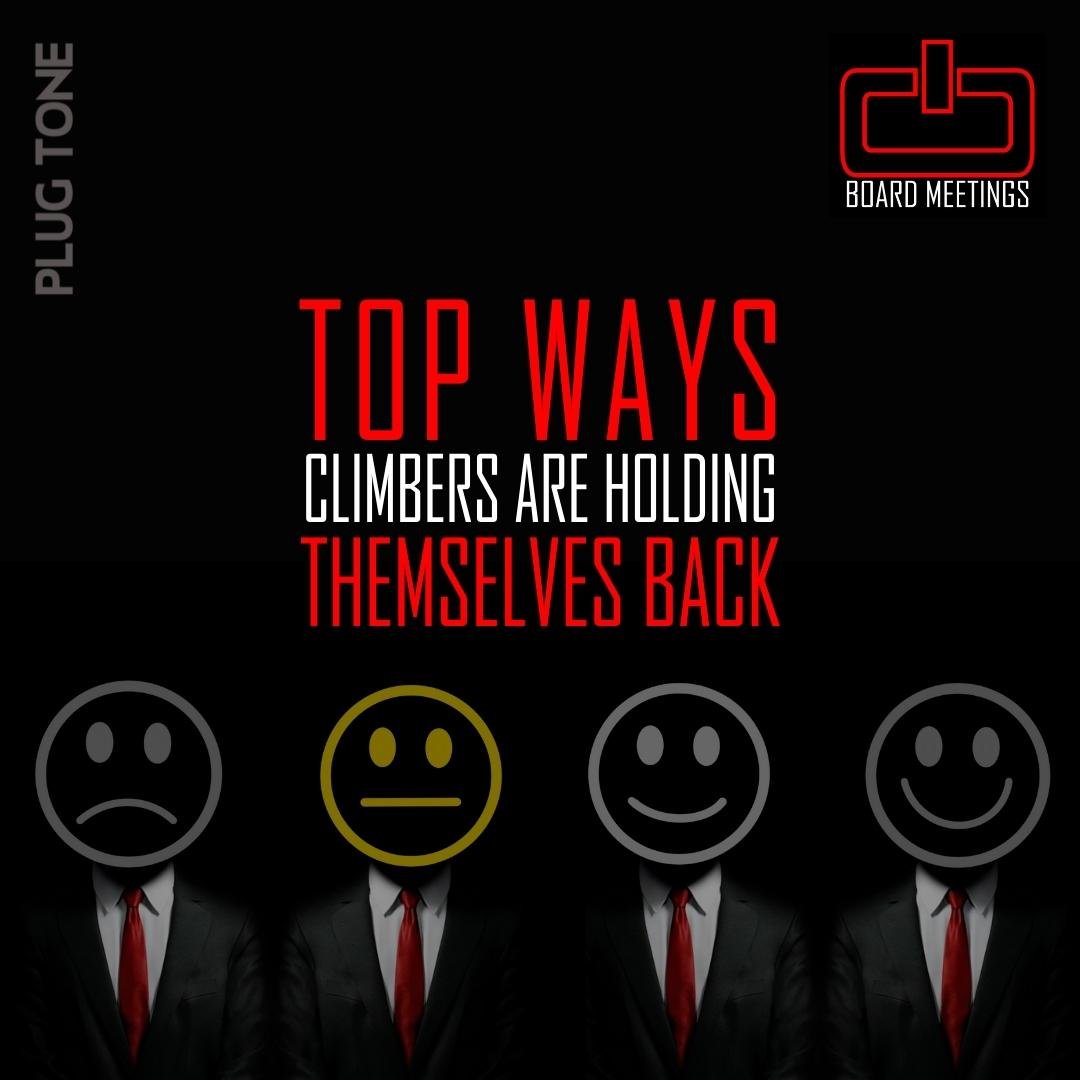
Kris and Paul dig into a paper that presents and then tests a method for measuring movement skills in sport climbing.